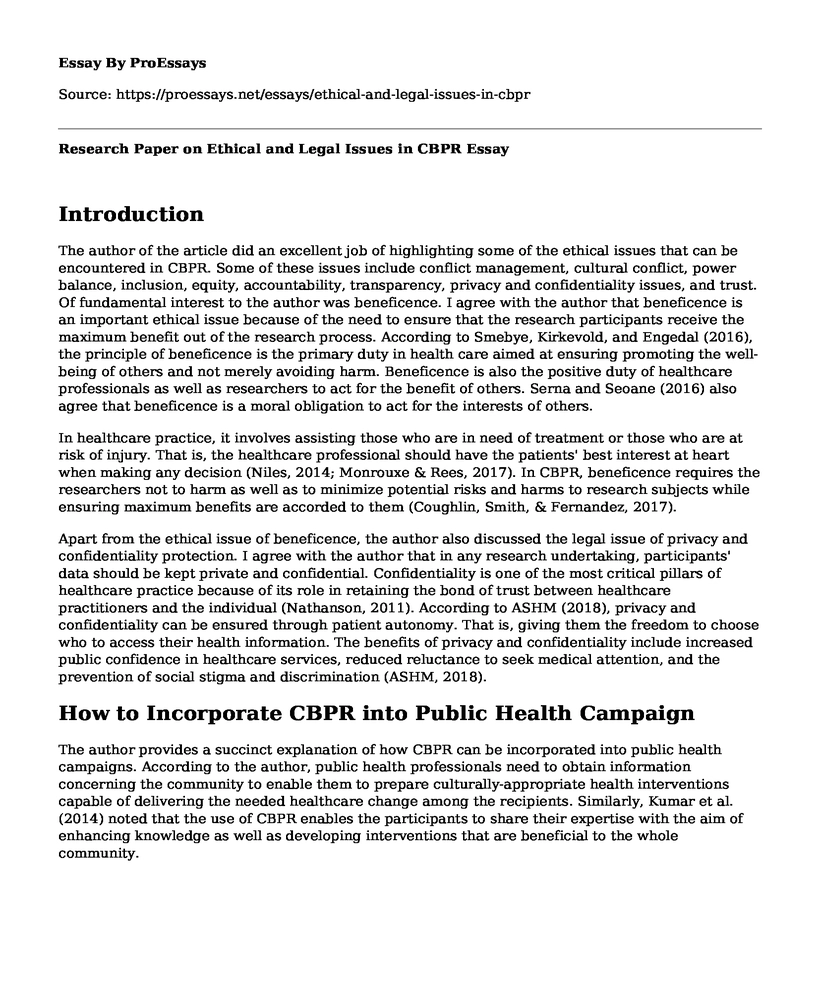Introduction
The author of the article did an excellent job of highlighting some of the ethical issues that can be encountered in CBPR. Some of these issues include conflict management, cultural conflict, power balance, inclusion, equity, accountability, transparency, privacy and confidentiality issues, and trust. Of fundamental interest to the author was beneficence. I agree with the author that beneficence is an important ethical issue because of the need to ensure that the research participants receive the maximum benefit out of the research process. According to Smebye, Kirkevold, and Engedal (2016), the principle of beneficence is the primary duty in health care aimed at ensuring promoting the well-being of others and not merely avoiding harm. Beneficence is also the positive duty of healthcare professionals as well as researchers to act for the benefit of others. Serna and Seoane (2016) also agree that beneficence is a moral obligation to act for the interests of others.
In healthcare practice, it involves assisting those who are in need of treatment or those who are at risk of injury. That is, the healthcare professional should have the patients' best interest at heart when making any decision (Niles, 2014; Monrouxe & Rees, 2017). In CBPR, beneficence requires the researchers not to harm as well as to minimize potential risks and harms to research subjects while ensuring maximum benefits are accorded to them (Coughlin, Smith, & Fernandez, 2017).
Apart from the ethical issue of beneficence, the author also discussed the legal issue of privacy and confidentiality protection. I agree with the author that in any research undertaking, participants' data should be kept private and confidential. Confidentiality is one of the most critical pillars of healthcare practice because of its role in retaining the bond of trust between healthcare practitioners and the individual (Nathanson, 2011). According to ASHM (2018), privacy and confidentiality can be ensured through patient autonomy. That is, giving them the freedom to choose who to access their health information. The benefits of privacy and confidentiality include increased public confidence in healthcare services, reduced reluctance to seek medical attention, and the prevention of social stigma and discrimination (ASHM, 2018).
How to Incorporate CBPR into Public Health Campaign
The author provides a succinct explanation of how CBPR can be incorporated into public health campaigns. According to the author, public health professionals need to obtain information concerning the community to enable them to prepare culturally-appropriate health interventions capable of delivering the needed healthcare change among the recipients. Similarly, Kumar et al. (2014) noted that the use of CBPR enables the participants to share their expertise with the aim of enhancing knowledge as well as developing interventions that are beneficial to the whole community.
References
Coughlin, S. S., Smith, S. A., & Fernandez, M. E. (2017). Handbook of community-based participatory research. Oxford University Press.
Monrouxe, L. V., & Rees, C. E. (2017). Healthcare professionalism: Improving practice through reflections on workplace dilemmas. John Wiley & Sons.
Niles, N. J. (2014). Basics of the U.S. health care system. Jones & Bartlett Publishers.
Serna, P., & Seoane, J.-A. (2016). Bioethical decision making and argumentation. Springer Publishers.
Smebye, K. L., Kirkevold, M., & Engedal, K. (2016). Ethical dilemmas concerning autonomy when persons with dementia wish to live at home: a qualitative, hermeneutic study. BMC Health Services Research, 16. https://doi.org/10.1186/s12913-015-1217-1
Cite this page
Research Paper on Ethical and Legal Issues in CBPR. (2022, Feb 11). Retrieved from https://proessays.net/essays/ethical-and-legal-issues-in-cbpr
If you are the original author of this essay and no longer wish to have it published on the ProEssays website, please click below to request its removal:
- Why Abortion Should Be Legalized Essay Example
- Personal Essay for UHD MSCJ Program
- Pursuing a Master Program Criminology Essay Example
- Essay Example on Decriminalization of Prostitution: The Dark Side
- Essay Example on Bonus Army: WWI Vets Fight for Rights
- Justice: Punishing Wrong and Upholding Right for a Just Society - Essay Sample
- The Notorious Serial Killer Ted Bundy: 30 Confirmed Murders and Beyond - Essay Sample







